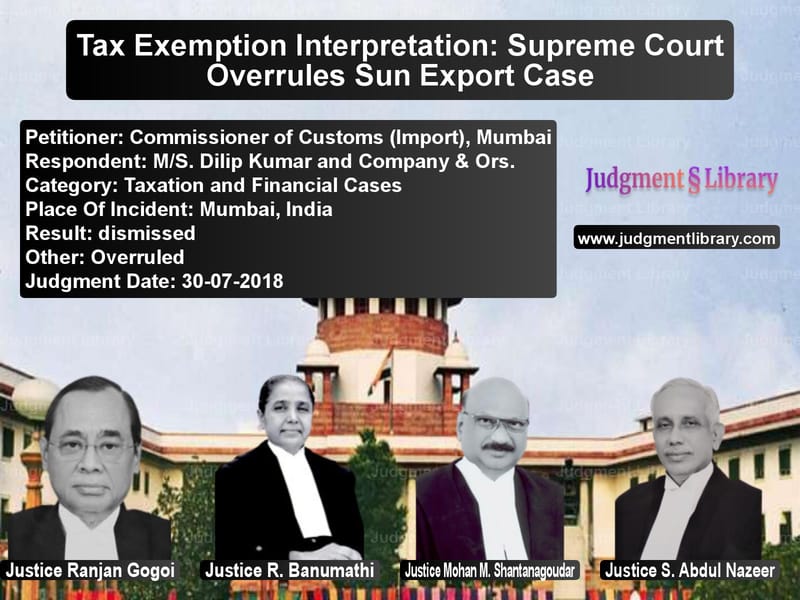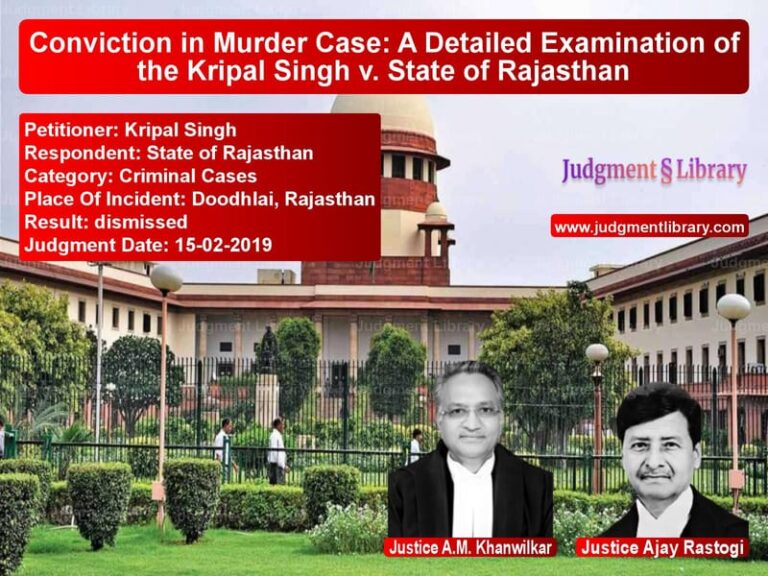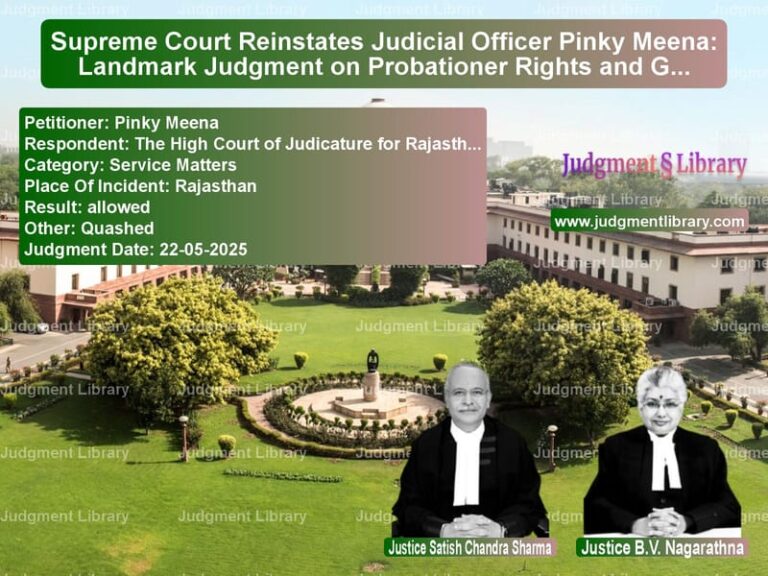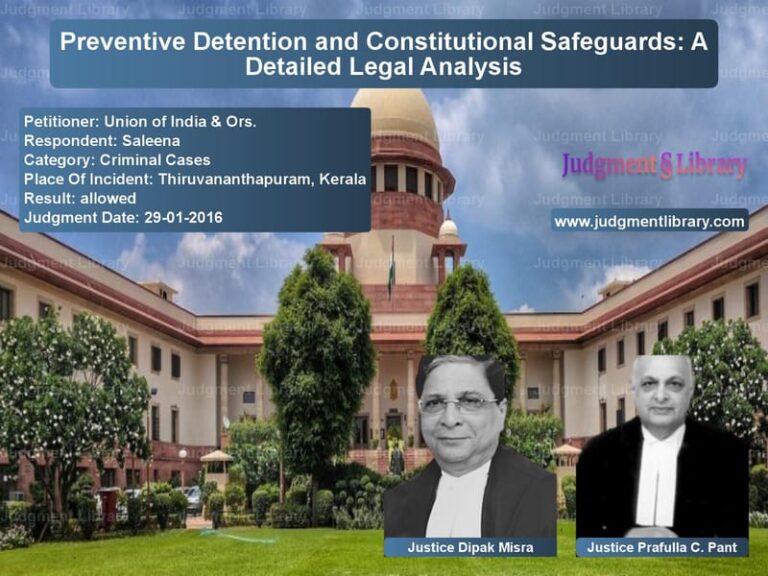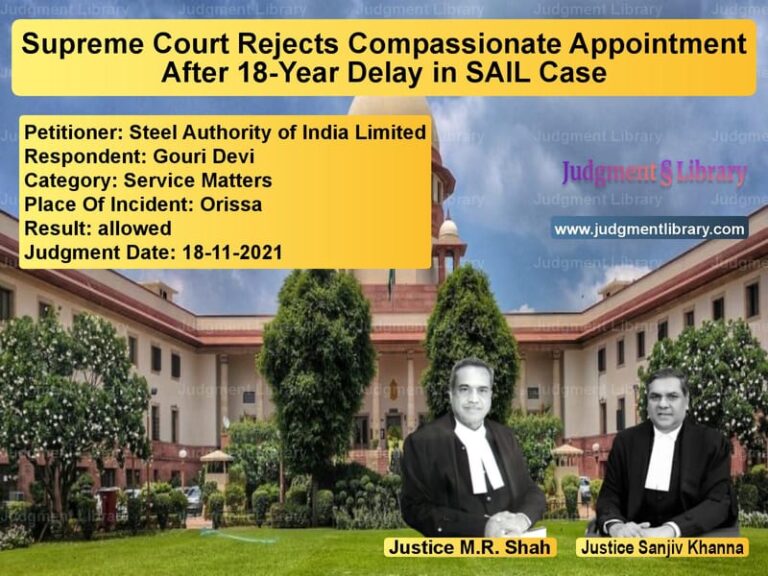Tax Exemption Interpretation: Supreme Court Overrules Sun Export Case
The Supreme Court of India, in the landmark case Commissioner of Customs (Import), Mumbai vs. M/S. Dilip Kumar and Company & Ors., delivered a significant judgment clarifying the interpretation of tax exemption provisions. The case revolved around the correct approach to understanding and applying tax exemptions when ambiguity exists regarding their applicability. The Court categorically overruled the judgment in Sun Export Corporation, Bombay vs. Collector of Customs, which had previously held that ambiguity in exemption provisions should favor the assessee.
This ruling carries crucial implications for businesses, tax authorities, and policymakers, as it reinforces the principle that tax exemption provisions must be strictly construed, and any benefit of ambiguity must favor the revenue rather than the taxpayer.
Background of the Case
The dispute arose when M/S. Dilip Kumar and Company imported a consignment of Vitamin-E50 powder (feed grade) under Bill of Entry No. 8207, dated August 19, 1999. The company claimed the benefit of a concessional duty rate of 5% instead of the standard 30% under Customs Notification No. 20/1999. They classified the product under Chapter 2309.90, which pertains to prawn feed, relying on the ruling in the Sun Export Case to claim the exemption.
However, the customs authorities denied the benefit of the exemption, contending that the imported goods contained chemical ingredients for animal feed rather than being actual animal feed or prawn feed. The Assistant Commissioner of Customs classified the consignment under Chapter 29, which attracted the standard duty rate. Dissatisfied with this ruling, the importers appealed the decision, leading to a series of legal battles.
Legal Issues Involved
- Whether tax exemption provisions should be interpreted in favor of the taxpayer when ambiguity exists.
- Whether Vitamin-E50 powder (feed grade) could be classified as prawn feed under the relevant exemption notification.
- Whether the principle laid down in the Sun Export Case was legally sound and should continue to be applied.
Petitioner’s Arguments
The Commissioner of Customs (Import), Mumbai, argued:
- Exemption provisions must be strictly construed since they grant a benefit that deviates from the standard tax regime.
- Ambiguity in tax exemption provisions should favor the revenue and not the taxpayer.
- The burden of proving eligibility for the exemption lay entirely on the importer.
- The Sun Export ruling was incorrect as it allowed undue tax benefits based on unclear provisions.
Respondent’s Arguments
The respondents, M/S. Dilip Kumar and Company, countered:
- When ambiguity exists in an exemption provision, it must be resolved in favor of the taxpayer.
- Their product met the criteria for concessional duty under the exemption notification.
- They relied on the judicial precedent established in the Sun Export Case, which supported their claim.
- Granting an exemption in cases of doubt ensures fairness and encourages economic activity.
Decisions of Lower Courts
The Commissioner of Customs (Appeals) overturned the Assistant Commissioner’s ruling and ruled in favor of the importers, applying the Sun Export principle. The Customs, Excise, and Service Tax Appellate Tribunal (CESTAT) upheld this decision. Aggrieved by these rulings, the revenue department appealed to the Supreme Court, seeking clarity on the interpretative rule applicable to tax exemptions.
Supreme Court’s Key Observations
The Supreme Court’s Constitution Bench reconsidered the principle established in the Sun Export Case and provided a detailed interpretation of how exemption notifications should be construed. The Court stated:
“An exemption from taxation must be construed strictly. If the taxpayer does not fall strictly within the words of the exemption, they cannot claim its benefit.”
The Court clarified that tax laws are to be interpreted strictly, and exemptions should not be granted merely because an assessee can create an argument in favor of eligibility. It further stated:
“The principle that ambiguity in an exemption provision must favor the assessee is incorrect. Exemption provisions should be strictly construed, and any ambiguity should favor the revenue.”
In making these observations, the Court overruled the Sun Export Case and laid down a clear approach:
- Tax exemption provisions must be strictly interpreted.
- If there is ambiguity, the benefit must go to the revenue, not the taxpayer.
- For an assessee to claim an exemption, they must prove beyond doubt that their case falls within the exemption’s language.
- Exemptions should not be granted through judicial leniency but should strictly follow legislative intent.
Final Judgment and Conclusion
The Supreme Court ruled:
- The judgment in the Sun Export Case was overruled.
- Strict interpretation of tax exemption provisions must be followed.
- Any ambiguity in exemption laws must be resolved in favor of the revenue authorities.
- The respondents were not entitled to the concessional duty benefit.
This decision is a landmark ruling in Indian tax law, reinforcing that tax exemptions should be narrowly interpreted to prevent unintended revenue losses. The judgment ensures uniformity and predictability in tax exemption cases, providing clear guidelines for businesses and tax authorities alike.
Petitioner Name: Commissioner of Customs (Import), Mumbai.Respondent Name: M/S. Dilip Kumar and Company & Ors..Judgment By: Justice N.V. Ramana, Justice Ranjan Gogoi, Justice R. Banumathi, Justice Mohan M. Shantanagoudar, Justice S. Abdul Nazeer.Place Of Incident: Mumbai, India.Judgment Date: 30-07-2018.
Don’t miss out on the full details! Download the complete judgment in PDF format below and gain valuable insights instantly!
Download Judgment: Commissioner of Cust vs MS. Dilip Kumar and Supreme Court of India Judgment Dated 30-07-2018.pdf
Direct Downlaod Judgment: Direct downlaod this Judgment
See all petitions in Income Tax Disputes
See all petitions in Customs and Excise
See all petitions in Tax Evasion Cases
See all petitions in Judgment by N.V. Ramana
See all petitions in Judgment by Ranjan Gogoi
See all petitions in Judgment by R. Banumathi
See all petitions in Judgment by Mohan M. Shantanagoudar
See all petitions in Judgment by S. Abdul Nazeer
See all petitions in dismissed
See all petitions in Overruled
See all petitions in supreme court of India judgments July 2018
See all petitions in 2018 judgments
See all posts in Taxation and Financial Cases Category
See all allowed petitions in Taxation and Financial Cases Category
See all Dismissed petitions in Taxation and Financial Cases Category
See all partially allowed petitions in Taxation and Financial Cases Category

